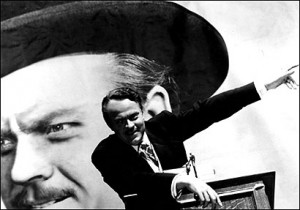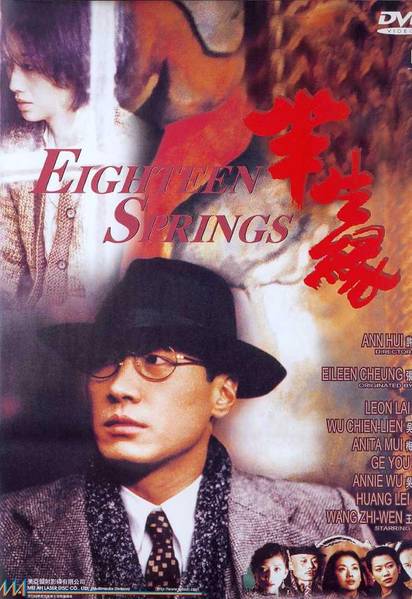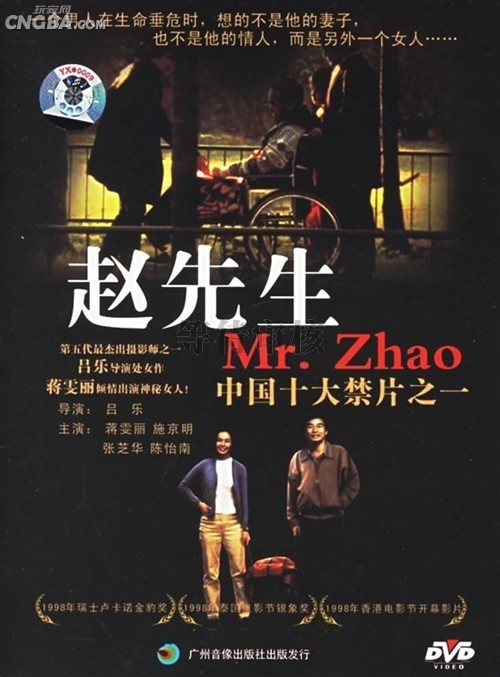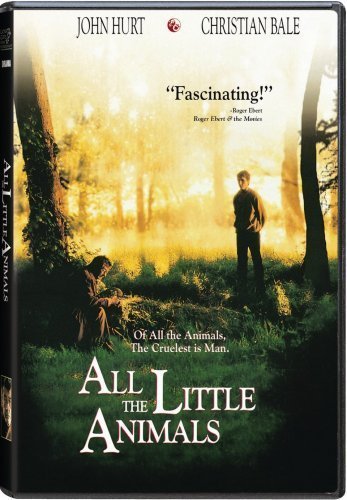A column for Caiman Cuadernos de Cine, written November 16, 2016. — J.R.
En Movimiento: The Man Who Would Be King
Errol Morris: “If you could give Charles Foster Kane advice, what would you say to him?”
Donald J. Trump: “Get yourself a different woman.”
— from a 2003 interview

It isn’t surprising that Citizen Kane is Donald Trump’s favorite movie. Thanks to the input of Herman J. Mankiewicz, an unhappy cynic, Orson Welles’ first feature is the only one he ever made that views corruption from a corrupted viewpoint; all the others see corruption from a vantage point of baffled innocence. As an actor who specialized in playing corrupt authoritarian figures — tycoons (Kane, Arkadin, Charles Clay), racists (Kindler, Quinlan), conniving magicians (Cagliostro, Welles himself in Follow the Boys and F for Fake), power-mad officials (Colonel Haki in Journey into Fear, Cesare Borgia in Prince of Foxes, the Advocate in The Trial), a sly racketeer (Harry Lime), and several dissolute rulers—before achieving his best role as Falstaff, an innocently jovial jester to a prince, which failed to engage the mass audience to the same degree (as did his more innocent heroes in The Lady from Shanghai and Othello) — Welles as an anti-authoritarian writer and director only confused matters for the general public by undermining what he celebrated as a performer. Read more
From the April 17, 1998 Chicago Reader. — J.R.

Eighteen Springs
Rating ** Worth seeing
Directed by Ann Hui
Written by John Chan
With Leon Lai, Wu Chien-lien, Anita Mui, Ge You, Annie Wu, and Huang Lei.

I don’t know exactly what I think about Ann Hui’s 12th feature, playing twice this weekend at the Film Center. At this point I don’t think it’s a masterpiece — though that doesn’t necessarily mean you shouldn’t see it. Arriving at these two conclusions is something of a professional necessity for me, because whenever I write a long review for this paper I have to assign the film a certain number of stars; if you look at the box headed “film ratings” the meaning of those ratings is spelled out, from “masterpiece” (four stars) to “worthless” (none). But sometimes this necessity presents me with a dilemma, because my better instincts tell me that it’s often impossible to know immediately after seeing a film whether it’s a masterpiece or not. And while I’m at it, let me confess to another doubt, one that relates to the general inflation of rankings that infects my profession, whether critics are reviewing a Hollywood blockbuster or a Hong Kong art movie: I fear that if I tell people that Ann Hui’s Eighteen Springs (or the Coen brothers’ The Big Lebowski) is only “worth seeing,” a lot of them won’t bother to go — even if maybe some of them should, for their benefit, not mine. Read more
From the September 3, 1999 Chicago Reader. It seems worth reposting because, I’m happy to report, both these films are now available on DVD. — J.R.

Mr. Zhao
Rating *** A must see
Directed by Lu Yue
Written by Shu Ping
With Shi Jingming, Zhang Zhihua, Chen Yinan, and Jiang Wenli.

All The Little Animals
Rating *** A must see
Directed by Jeremy Thomas
Written by Eski Thomas
With John Hurt, Christian Bale, Daniel Benzali, James Faulkner, and John O’Toole.
Two of the best movies of 1998 are opening in Chicago this week — which makes them two of the best movies of 1999 — but the odds of either making much of a splash are just about nil. For one thing, they don’t appear to have opened previously anywhere else in the U.S., ruling out any advance buzz. For another, the budget for publicity in both cases appears to be about 15 cents; by contrast, the advertising budget for Austin Powers: The Spy Who Shagged Me was between $35 million and $40 million, not counting the Time Warner tie-ins (the entire production budget was $33 million). As a consequence, information about both films is hard to come by — I can’t even determine whether the screenwriter of Mr. Read more





